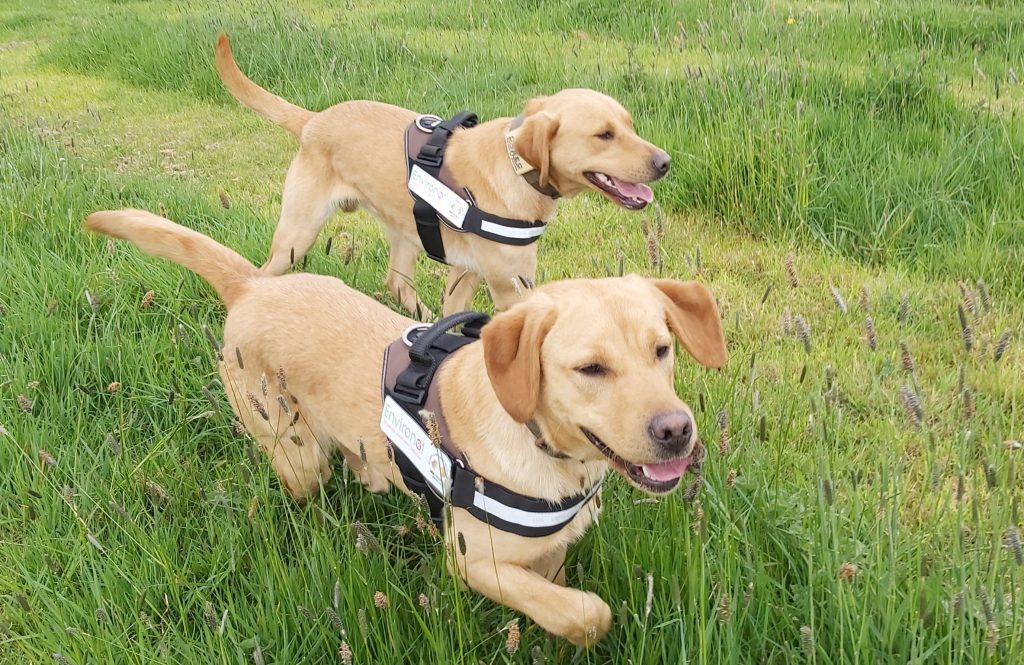Homeowners in the UK concerned about the threat of Japanese knotweed can now call on man’s best friend to find out whether their property, or one they wish to buy, is affected by the country’s most invasive plant.

Specially trained for Environet UK to detect Japanese knotweed rhizome, even in small quantities hidden beneath the ground, detection dogs Mick and Mack can cover a garden or development site in a matter of minutes and will indicate by ‘freezing’, or staying completely still, when Japanese knotweed is detected.
In a UK first, the pair of one-year-old Fox Red Labrador Retrievers are now out and about rooting out knotweed for home owners, home buyers and landowners across the country, thanks to the 300 million or so receptors in their noses and a proportion of brain area dedicated to smell which is 40 times larger than a human’s.
Trained by experts RFA Security, who provide security and detection dogs for various purposes including finding explosives, narcotics and even bedbugs, Mick and Mack can carry out a Japanese knotweed survey much faster and more accurately than a human.
Environet says that dog detection is the most precise method available to determine whether knotweed is present and can be carried out at any time of year, including during winter when the plant is dormant beneath the ground.
Japanese knotweed was introduced to the UK from Japan in the 1840s and now thrives in our parks and gardens, along waterways and railways. It can grow at the incredible rate of 10cm per day to reach up to 3 metres in height by late summer.
Described by the Environment Agency as “indisputably the UK’s most aggressive, destructive and invasive plant”, knotweed can cause extensive damage to property, breaking through cracks in mortar, brickwork, joints in concrete, drains, sewers, driveways and even the cavity walls of our homes.
Home sellers must declare knowledge of knotweed
Sellers are required by law to declare if their property is affected by Japanese knotweed on the Law Society’s TA6 form, completed as a standard part of the conveyancing process.
Unless they are absolutely certain that there is no knotweed (including below ground rhizome) on their property or within 3 metres of the boundary, the guidance recommends that sellers respond “Not known” in order to protect themselves from future legal action if knotweed is subsequently discovered.
This places the onus on the buyer to carry out their own checks, which is where the detection dogs can help by surveying the property for any trace of knotweed, including where it has been deliberately concealed.
A dog detection survey not only offers peace of mind to homebuyers, but also additional reassurances to lenders in situations where a surveyor has recommended further investigation, for example in high-risk areas or where knotweed is growing nearby.
Nic Seal, founder and managing director of Environet, said: “Japanese knotweed is a growing problem for homeowners in the UK and misrepresentation cases are on the rise, where sellers have answered dishonestly about whether their property is affected or deliberately concealed the plant.
“It’s not uncommon for knotweed to be cut back prior to a survey and I’ve even seen cases where the seller has placed a membrane horizontally in the ground over a knotweed infestation and laid a lawn or pathway over the top.”
Jason Collins, operations manager at RFA Security, commented: “Highly trained detection dogs have a long history of working with the police and security services to find drugs and weapons, but increasingly they’re also taking on exciting new roles such as in the health and environmental sectors.
“Now, for the first time in the UK, dogs will be on the front line in the battle against Japanese knotweed, helping protect homeowners as well as our fragile native ecosystems.”
Dog detection surveys will also be useful to sellers of property in locations badly affected by knotweed, who may wish to reassure potential buyers from the outset that the plant is not present.
Environet’s live Japanese knotweed heatmap allows people to enter a postcode to discover the number of infestations within a 4km radius, with the worst affected areas highlighted in yellow or red.
The high accuracy rate of its dog detection surveys has prompted Environet to offer a free five-year insurance-backed guarantee to owners of residential property where knotweed is not detected.
Click here to watch a video of Mick and Mack in action.














